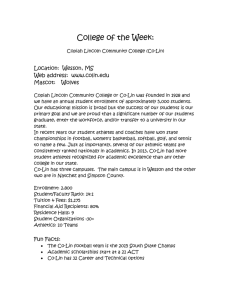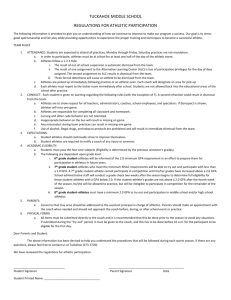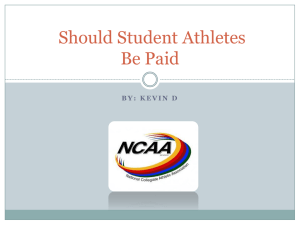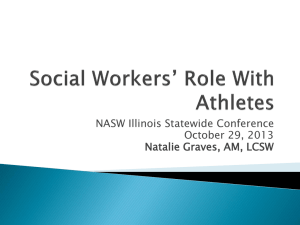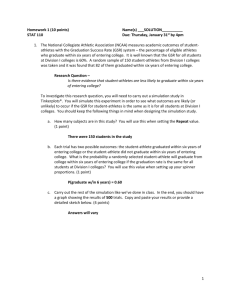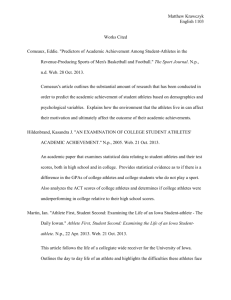Final Draft – Assignment Three
advertisement
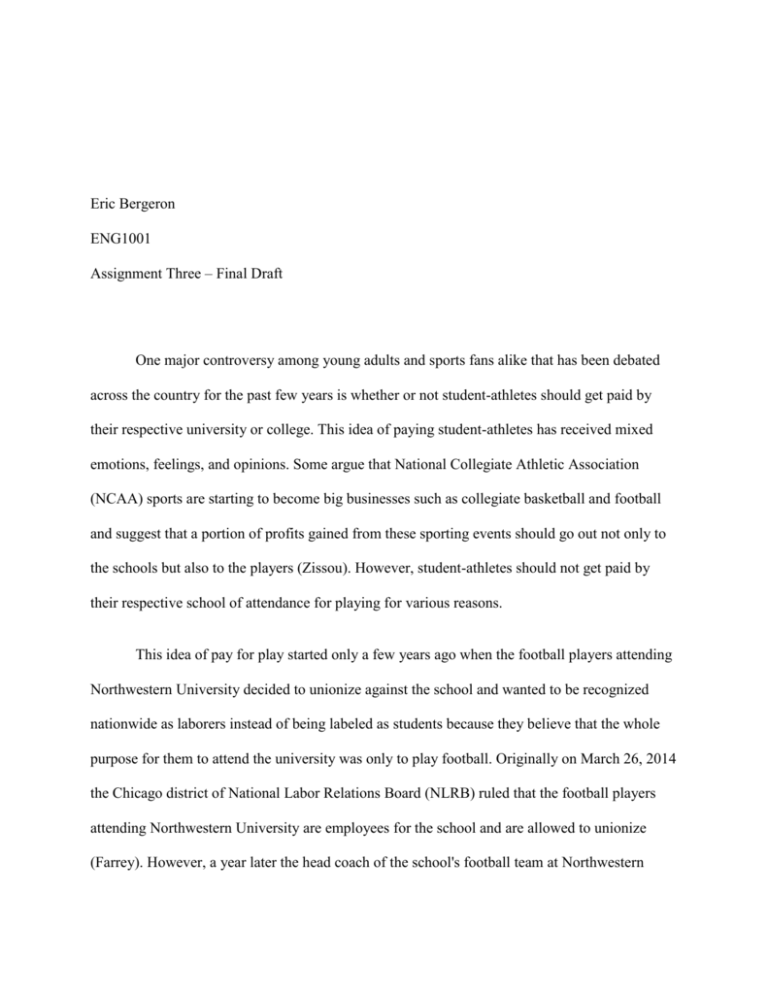
Eric Bergeron ENG1001 Assignment Three – Final Draft One major controversy among young adults and sports fans alike that has been debated across the country for the past few years is whether or not student-athletes should get paid by their respective university or college. This idea of paying student-athletes has received mixed emotions, feelings, and opinions. Some argue that National Collegiate Athletic Association (NCAA) sports are starting to become big businesses such as collegiate basketball and football and suggest that a portion of profits gained from these sporting events should go out not only to the schools but also to the players (Zissou). However, student-athletes should not get paid by their respective school of attendance for playing for various reasons. This idea of pay for play started only a few years ago when the football players attending Northwestern University decided to unionize against the school and wanted to be recognized nationwide as laborers instead of being labeled as students because they believe that the whole purpose for them to attend the university was only to play football. Originally on March 26, 2014 the Chicago district of National Labor Relations Board (NLRB) ruled that the football players attending Northwestern University are employees for the school and are allowed to unionize (Farrey). However, a year later the head coach of the school's football team at Northwestern appealed the case and then a year later on August 17, 2015 the National Labor Relations Board overruled their previous decision and stated that football players at Northwestern University are not allowed to unionize (Farrey). Even with this court decision, the debate over whether studentathletes should get paid continues. The large amounts of revenue universities make whether through tuition or from sporting events should be focused more on education and not athletics. Basketball and football games at the collegiate level get as much attention as the National Football League (NFL) and National Basketball Association (NBA) at the professional level. These sports attract large audiences whether at the campus itself or on television such as viewing college football game broadcasts on ESPN or FOX Sports making them the only sporting events that make money for the university. Furthermore, collegiate sports such as tennis, swimming, and volleyball which do not receive much of an audience at their matches would have to drop out (Zissou). If student-athletes were to get paid then this would create a problem because then all student-athletes from all the sports a university has in its athletic department would have to get paid (Zissou). It is also very important to note that schools competing in Division II and III won't have as much money as their Division I to play all of their student-athletes should they were to get paid. In addition, if all of the student-athletes on campus were to get paid then that could also potentially increase tuition costs for other students arriving on campus. This could affect prestigious universities such as Ivy League colleges attracting students all over the world from attending because even though some have met the universities requirements they might not have a chance of attending the school since tuition would be extremely high. Therefore, it will benefit the majority of the students on campus for the university to spend their money more wisely on more important things relating to education purposes. Paying student-athletes would also present several issues towards the National Collegiate Athletic Association (Simzak). ''First among them would be the fact that by paying college athletes, whether by salary or stipend, the athletes would lose their amateur status and become employees of the institution that they represent" (Simzak). By losing their status as amateurs then this could create a problem worldwide because the Olympics (winter or summer games) do not pay the athletes competing in the sporting events and it is important to note that most of the athletes representing the countries including the United States are college and high school students around the ages of 16- 24. Should universities start to pay their student-athletes then who would the United States send overseas to compete at the Olympics. This could also possibly mean that the Olympic Committee would have to change their policies and start paying the athletes at the games themselves. In addition, this could also mean that students competing in athletic events at their respective university outside of the United States would have to get paid then. Competition between rival schools for recruits could also have an impact on paying student-athletes if they were to get paid. Recruiting is a very complex and challenging process as a way for many college coaches to sit down and talk to talented high school athletes to attend their school. If student-athletes were to get paid then that will affect the whole recruiting process between schools within the same general area because larger, more prestigious universities such as the University of Alabama and University of Notre Dame have more money than schools that compete in Division II and III. For example, Nick Saban the head football coach at the University of Alabama makes $5.5 million alone (Zissou). Furthermore, the University of Texas at Austin makes almost $170 million a year from athletic events (Gaines), whereas the average Division II school makes only $4.5 million a year (Division II Athletics Expenses). Using the University of Texas as another example is that "it would be hard for a top recruit to turn down an offer guaranteeing a higher compensation from a wealthy athletic department, such as the University of Texas, for a school that is equally competitive on the field, but not so much with its checkbook a la Kansas State" (Merkle). Therefore, it will be unfair for these smaller schools to compete with larger schools for attracting high school talent. Many schools might not even have the money to pay all of their athletes. In 2012, only 23 out of 228 Division I schools made just enough money to cover the expenses of their studentathletes (Zissou). If student-athletes were being paid then each college or university will have different salaries to pay their athletes which will also affect the recruiting process since different schools have a certain number of athletes on their respective roster. For example, the football at the University of Michigan has 143 players on their roster (2015 Michigan Football Roster). For comparison with a Division II school, for example Saint Augustine University (located in Raleigh, North Carolina) has only 70 players on their football roster (2015 Football Roster). Should student-athletes get paid then a lot of unanswered questions will arise such as the salaries for student-athletes with the number of players on each school's roster, how much a football player will make in comparison to a swimmer, and whether certain colleges and universities will be able to pay every single one of their student-athletes. Student-athletes I think should look towards getting an education instead of debating whether or not to unionize. According to one article, people need a college education as an avenue for future success because only a small fraction of college athletes will be drafted by professionals (Hearn). As an alternative to paying student-athletes, universities should use the money they make each year and use it towards educational purposes such as field trips or even the latest technologies for research. Furthermore, it is important to note that student-athletes are just the same as other students attending school; therefore they shouldn’t get paid and be labeled as laborers and that getting an education is the whole purpose of a college or university. Should student-athletes get paid to play then this could potentially cause a rift on campuses nationwide because students who do not participate in athletics nor attend the school's matches and are only interested in getting an education won't be paid money whereas some students will. In addition, I believe it is necessary for students who were recruited to play sports at a particular school should focus on a more legitimate career possibility. Research conducted by the National Collegiate Athletic Association showed that only 2.0% of all collegiate football players make it to the National Football League (NFL) and that only 1.3% of all collegiate basketball players make it to the National Basketball Association (NBA). There are thousands of options and numerous opportunities given for students attending college to pursue a more possible career choice instead of becoming a professional athlete. There are some that feel that student-athletes should be paid by their respective university. According to one article, many Division I schools make millions of dollars from television deals, advertising, and even ticket sales from the major sporting events; therefore with all of this money the athletes should get paid a portion of the profits (Eitzen). Some schools such as the University of Texas at Austin and Brigham Young University have their own television network, ESPN Longhorn Network and BYUtv respectively (Normand). It is true that many of the top Division I schools such as the University of Alabama or University of Michigan make a lot of revenue from their athletic programs, however this does not mean schools from Division II or III make the same money as their competition since these schools don’t attract large audiences or have TV deals with ABC or ESPN as examples. If college athletes were to get paid then Division II and III schools would have to drop most of their sport programs simply because they don’t have the money to do so. According to another article, student-athletes spend on average 40 hours a week practicing, training, and competing making it hard for them to find a part-time job while in school and therefore should get paid (Zissou). It is true that it is very difficult for student-athletes to find a another job during their season but it is important to consider that many other students don’t have the same work week as athletes so it would not be fair to them. In addition, studentathletes should instead look towards a legitimate future career by looking for part-time jobs in that department of study when their season is over. "For better or worse even if an athlete does not pan out in the professionals, they at least made a name for themselves. It will help them find a job when they graduate - - debt free - - out of college" (McCauley). Another problem that colleges and universities across the country might face if they were to pay their student-athletes is whether or not the male and female athletes will get paid the same amount of money. As already mentioned, many sporting events on campuses such as collegiate swimming, tennis, and volleyball do not attract large audiences or even get broadcast on major networks such as ESPN, FOX Sports, or even CBS let alone on national television. "The NCAA reported that 28.3 million viewers watched the 2015 NCAA Men’s Division I National Championship between Wisconsin and Duke. They also reported there were 3.1 million viewers for the 2015 NCAA Women’s Division I National Championship between Notre Dame and UConn" (McCauley). These statistics show that more people nationwide prefer to watch men sports than to watch women sports even though the female athletes put in the same amount of practice and hard work each week as the men do. "The same goes for Division II and Division III sports. Why shouldn’t those athletes be paid the same if they put in the same amount of time to practice, travel, and play games?" (McCauley). As already mentioned, Division II and III schools do not generate the same amount of revenue as Division I schools do, so just like the women who put in the same amount of hard work, practice, and preparation each week before each match these student-athletes should get paid the same amount of money as student-athletes from Division I schools should student-athletes get paid in the future. I decided to conduct field research around my local campus at the University of Cincinnati at Blue Ash as well as talking to some of my close friends who played varsity football at my former high school. The type of field research that was conducted was a survey and this consisted of asking students what their thoughts were on this issue and a brief explanation as to why they felt this particular way. The majority of students I surveyed agreed that college athletes should get paid and most of them came to a same explanation for the way they felt which was that the schools make millions of dollars each year from jersey sales, TV deals, attendance at the sporting events, etc. However, there were a few students who thought differently and took the same position on this issue as myself. One student explained that student-athletes shouldn't get paid since there are so many universities and colleges alike in this country that all differentiate in terms of the level of competition and that it would be unfair for a school such as Marshall University (the example this particular student gave) compete alongside a more prestigious university such as the University of Alabama. One of my fellow classmates also agreed that student-athletes shouldn't get paid simply because universities such Ohio State have so many football players on their active roster in comparison to professional team competing in the National Football League. Another student explained to me that it would be unfair for universities to start paying their athletes because that might give the students a sense that maybe they don't have need to go professional in order to get paid and instead just get paid lots of money from their school they're currently attending right now and that NCAA football would be like in quote "just another NFL." As you can see paying student-athletes is the wrong thing to do because the NCAA is not a professional league or a big business like the NFL, NBA, and MLB and that these athletes are simply amateurs not professionals. As mentioned, most student-athletes should look towards a more legitimate career since only a small percentage make it professionally and simply unfair towards the athletes competing at Division II and III schools who make less revenue at their sporting events than the average Division I school. Most of the collegiate stars that we watch on TV such as the eventual Heisman Trophy winners in the future will most certainly be part of that small fraction of NCAA athletes that will make it professionally and eventually get paid to play. I feel that student-athletes should stop thinking about forming unions and demanding money from their school and instead take pride in representing their school, feel the rush of adrenaline when they step out onto the field, and give their hearts out for playing their respective sport and to their fellow classmates and fans. "Most college football fans love the game because the foundation of college athletics is, and always has been, competing for the love of the game rather than playing for a paycheck" (Merkle). Work Cited 1. Hearn, Thomas K. “College Athletes Should Not Be Allowed to Unionize.” Should College Athletes Be Paid? Ed. Geoff Griffin. Detroit: Greenhaven Press, 2008. At Issue. Rpt. from “The Culture of Sport and the Future of Intercollegiate Athletics: Address to the Association of Governing Boards, Boston, MA.” www.wfu.edu. 2002. Opposing Viewpoints in Context. Web. 8 Oct. 2015. 2. Eitzen, D. Stanley. “College Athletes Should Be Paid.” Sports and Athletes. Ed. James D. Torr. San Diego: Greenhaven Press, 2005. Opposing Viewpoints. Rpt. from “Slaves of Big-Time College Sports.” USA Today Magazine Sept. 2000: 26. Opposing Viewpoints in Context. Web. 8 Oct. 2015. 3. Zissou, Rebecca. “Fair play: should college athletes get paid?” Junior Scholastic/Current Events 9 Dec. 2013: 15+. Opposing Viewpoints in Context. Web. 8 Oct. 2015. 4. Farrey, Tom. "Northwestern Players Denied Request to Form First Union for Athletes." ESPN. ESPN Internet Ventures, 17 Aug. 2015. Web. 05 Dec. 2015. 5. Gaines, Cork. "The 20 Colleges That Make The Most Money On Sports."Business Insider. Business Insider, Inc, 11 Sept. 2014. Web. 05 Dec. 2015. 6. "Division II Athletics Expenses." NCAA.org. N.p., 19 Nov. 2013. Web. 05 Dec. 2015. 7. Normand, Travis. "How Strong Are the Cougs' TV Ties?" Bleacher Report. N.p., 5 Mar. 2012. Web. 05 Dec. 2015. 8. Simzak, Michael. "Bowling for Dollars: Should College Athletes Be Paid?"The Huffington Post. TheHuffingtonPost.com, 19 Dec. 2011. Web. 05 Dec. 2015. 9. McCauley, Kieran. "College Athletes Shouldn’t Be Paid." College Athletes Shouldn’t Be Paid. Daily Local News, 28 Apr. 2015. Web. 05 Dec. 2015. 10. Merkle, Andrew. "NCAA Would Be Making Mistake by Paying Athletes." The State News. N.p., 18 Mar. 2015. Web. 05 Dec. 2015. 11. "2015 Michigan Football Roster." Official Roster. University of Michigan Athletics, 2015. Web. 05 Dec. 2015. 12. "2015 Football Roster." Saint Augustine's University Falcons, 2015. Web. 05 Dec. 2015.
